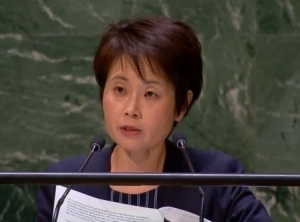Statement by Ms. YOSHIDA Aya, Minister, Permanent Mission of Japan to the United Nations, on the Revitalization of the Work of the General Assembly [Item 120]
2023/11/10

(as delivered)
I thank you, Mr. President for convening this plenary meeting on the Revitalization of the work of General Assembly.
First, Japan would like to thank Ambassador Egriselda Gonzalez Lopez, the Permanent Representative of El Salvador, Ambassador Mitch Fifield, the former Permanent Representative of Australia and their team for their excellent way they steered the Ad Hoc Working Group on the Revitalization of the Work of the General Assembly as its co-Chairs at the seventy-seventh session. We would like to congratulate the co-Chairs of the seventy-eighth session, Ambassador Cornel Feruță and Menissa Rambally, the Permanent Representatives of Romania and Saint Lucia for their appointment. Japan looks forward to working with you toward a successful and fruitful process.
Mr. President,
We stand at a historical inflection point in our world today and learned that the effective multilateralism is key to address the plethora of global complex crises and challenges we are facing today.
The General Assembly, as the sole organ that represents all Member States, holds the potential to serve as a platform for Member States to come together and restore the trust of the people in the United Nations. This is why it is vital to revitalize the GA in a manner that makes it more effective and efficient.
To that end, we must continue to foster greater synergy and interactivity between the General Assembly, the Security Council, the Economic and Social Council and the Main Committees to enhance the capacity and functionality of the United Nations. We commend the effort made to reinforce synergy, coherence, and complementarity between the GA, Main Committees, and ECOSOC, as outlined in the recent resolution. We particularly welcome the agreement reached in this session to further promote coordination and interaction between GA and the Security Council.
In certain circumstances, we saw the Security Council not able to respond to its expectations. This has prompted Member States to recognize not only the urgent need to reform the Security Council, but also the critical functions, powers, and roles of the General Assembly in matters related to international peace and security. We support the implementation of resolution 76/262, which calls for the accountability on the use of the veto, through the submission of special reports and explanation at the General Assembly. I would like to emphasize that restraining the use of the veto will help restore confidence in the Security Council and the entire United Nations.
Mr. President,
Efficiency and effectiveness are attainable only when the workload is reasonable and manageable. The number of meetings we had during the last session had been a concern for many delegations, particularly for smaller ones. Streamlining the agenda of the General Assembly and aligning the agendas of principal organs to avoid duplication of work is an essential step forward. We look forward to further negotiations with the input of the conference room paper to be published during this session, outlining the evolution of the General Assembly’s agenda. We deeply appreciate the intention of the President of the General Assembly to continue convening informal meetings of the General Committee to elaborate concrete proposals on this matter. We also propose further discussions on the possibility of harnessing the General Committee to improve working methods.
Mr. President,
During the last session, we agreed to strengthen the structures that support the President of the General Assembly. We hope that this will continue to the work of the OPGA and the DGACM.
Mr. President,
The resolution to be negotiated in the Seventy-Ninth Session is the last one before the election of the Secretary General, which must be enforced with transparency. Member States have recommended to circulate the joint letters by the President of the General Assembly and the Security Council on the selection process of the Secretary General and invited the voluntary disclosure of any funding sources related to their candidature which should surely improve transparency of the process. This, however, is not quite enough. Allow me to make reference to a note issued under the former Japanese Ambassador’s personal capacity, circulated as UN document under symbol A/71/774-S/2017/93, in which an overview of the entire selection process, along with lessons learned during the 2016 selection process can be found. In line with this letter, we believe that there should be a discussion on reviewing the selection process, including replacing straw polls by official votes and also call for the Security Council to decide on basic principles and rules among members for the selection process. We would do well to bear in mind that there has yet to be a female Secretary-General.
Lastly, Japan expresses its full confidence in the distinguished Co-chairs and their chairmanship to guide us in achieving further progress in revitalizing the General Assembly. Japan will continue to contribute tirelessly in this discussion as this agenda is a critical component of the overall reform of the United Nations, for it is our shared responsibility to ensure that it remains relevant to address current and future challenges.
I thank you.
